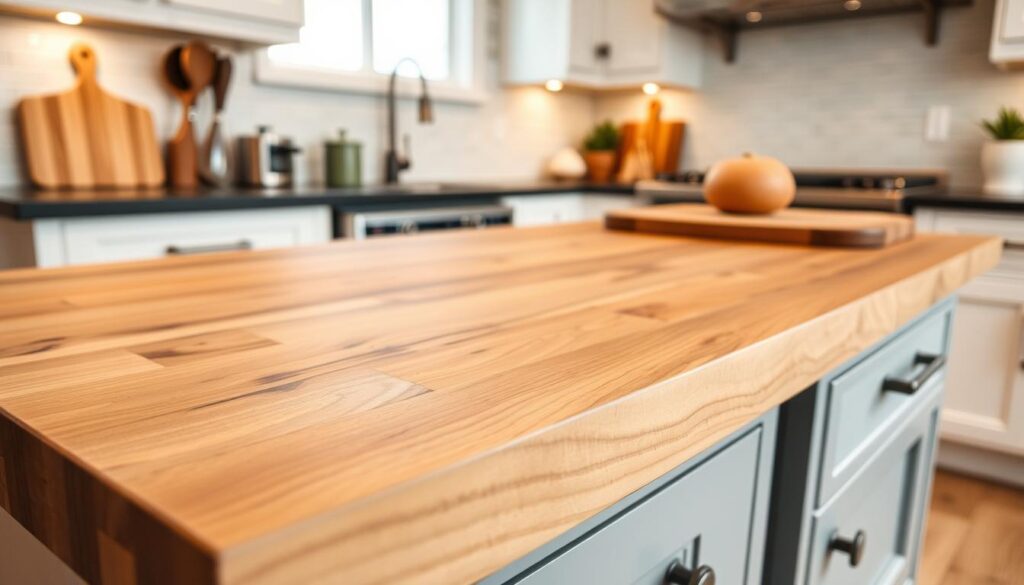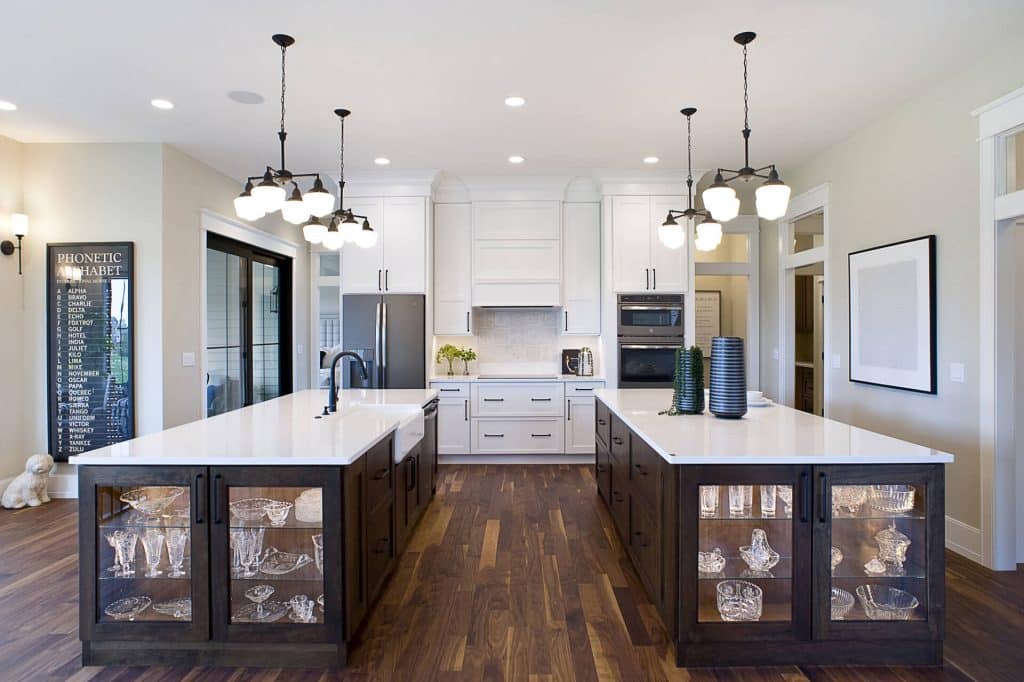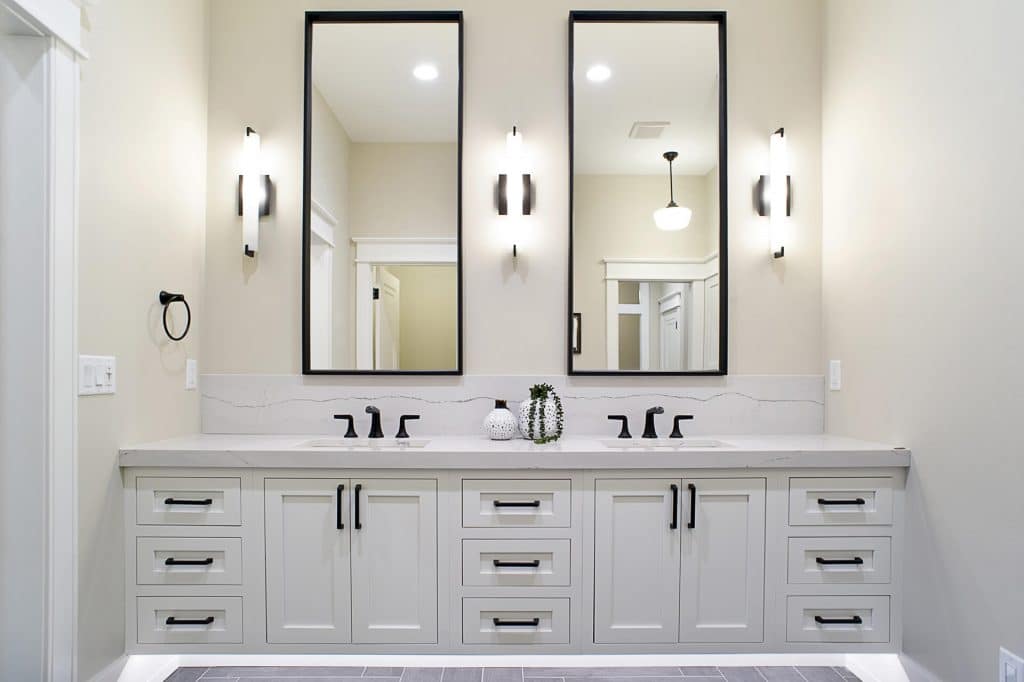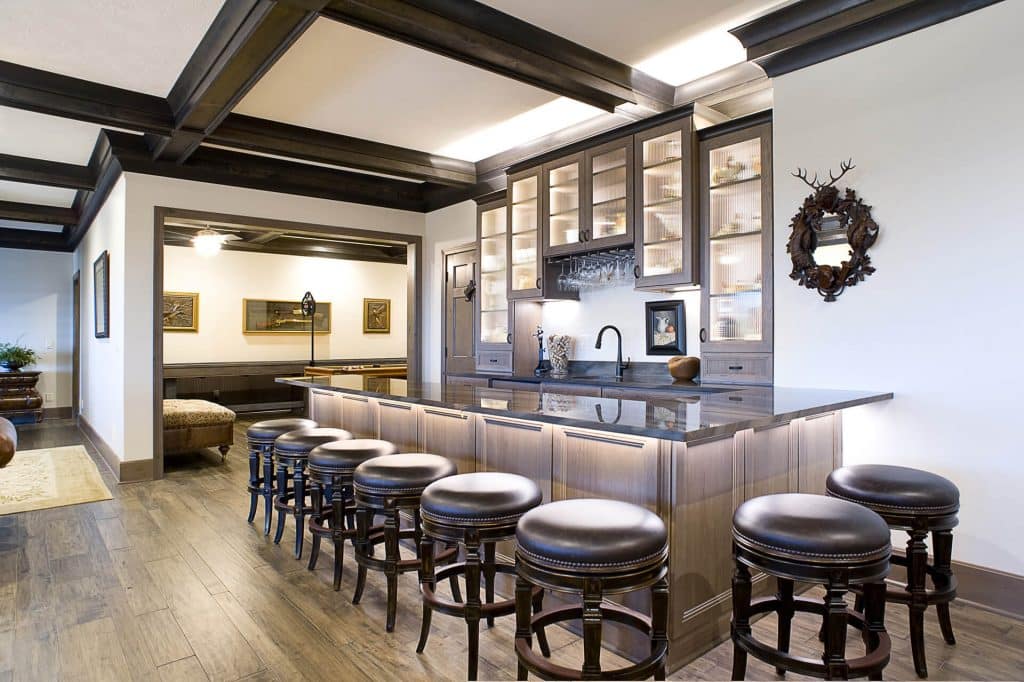Planning your dream kitchen? You might wonder are butcher block countertops durable enough for everyday kitchen use. They’re popular for their look and function. But can they handle busy kitchens?
This article explores butcher block countertops’ durability. We’ll look at their good points and challenges. You’ll learn about their upkeep and how they compare to other materials. Knowing the pros and cons of butcher block is key when choosing countertops for your kitchen.
Key Takeaways
- Butcher block countertops can last over 20 years with proper care.
- Maintenance includes periodic oiling to prevent cracking.
- They are more budget-friendly compared to high-end materials like granite.
- Wood’s porous nature makes butcher blocks more prone to staining.
- Minor damages can often be sanded down and repaired easily.
- Susceptible to environmental changes, they may expand or contract.
- Ideal for both home cooks and culinary professionals due to durability.
Understanding Butcher Block Countertops
Butcher block countertops are made from solid hardwood planks stuck together. They create a warm and inviting surface perfect for kitchens. These countertops are known for their strong design, ready to handle daily kitchen tasks.
They can be either edge-grain or face-grain. Edge-grain is hard and durable, great for resisting wear and tear. Face-grain is softer and looks nice but may show scratches more.
What Are Butcher Block Countertops?
These countertops are loved for their practical and beautiful qualities. They add an organic feel to kitchens and match many designs. With the right care, they can handle daily tasks like slicing food.
They can also be refinished to look like new again. This makes them last longer than other surfaces.
Common Materials Used in Butcher Block
Butcher block countertops are mostly made from hardwoods like maple, walnut, oak, and cherry. Each wood type adds its own unique look and feel. Bamboo is another choice, being more eco-friendly and water-resistant.
End grain options are strong for heavy chopping but cost more. This is because they are made in a special way.
Popular Design Styles and Finishes
Countertops come in many designs and finishes to fit different tastes. You can find plank designs and detailed patterns that show off craftsmanship. Finishes range from natural oils to food-safe options, protecting the wood while looking good.
This variety means there’s something for every kitchen, whether you like modern or rustic looks.
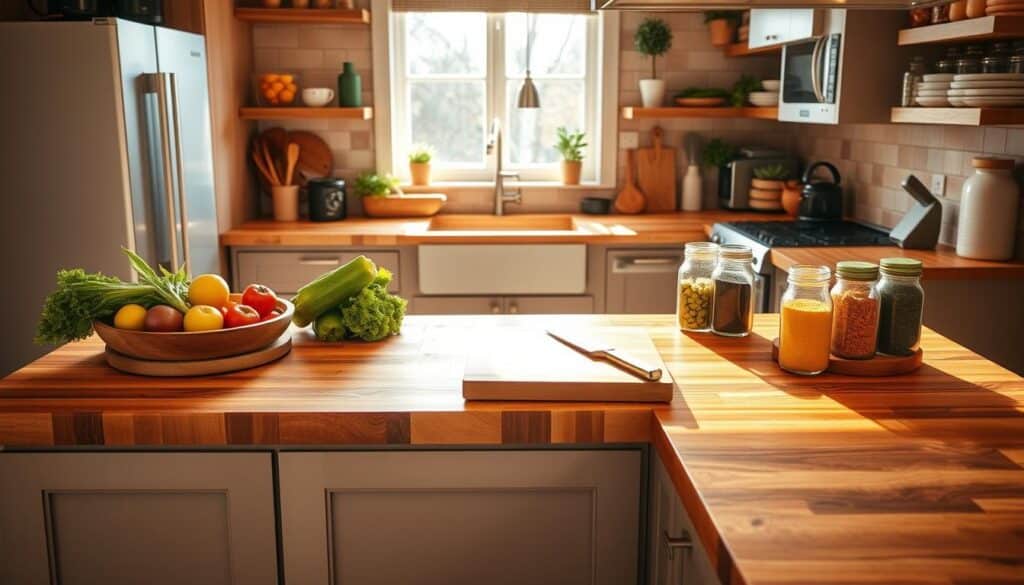
Pros of Butcher Block Countertops
Butcher block countertops are loved for their style and function. They have a natural wood look that adds warmth to any room. This makes them perfect for kitchens, dining areas, and workstations.
Aesthetic Appeal in Kitchen Design
The warm look of butcher block makes kitchens feel cozy and inviting. You can choose from many wood types and finishes to match your style. This makes butcher block stand out from cold, synthetic materials, adding charm to your home.
Natural Material Benefits
Butcher block countertops also have eco-friendly benefits. They’re often made from wood that’s good for the planet. They’re as durable as stone, lasting 20 years or more with the right care.
Maintaining them is easy. Just sand them lightly and apply food-safe oils now and then. This keeps them looking great.
Versatility and Functionality
Butcher block countertops are versatile and fit well in many spaces. They work great with floating shelves and workstation areas. They’re gentle on dishes and make a beautiful workspace.
They’re easy to care for, making them a top choice for modern kitchens. Their adaptability and maintenance ease show why butcher block is so popular.
Cons of Butcher Block Countertops
Butcher block countertops are attractive and warm. But, they can scratch easily, need a lot of care, and might harbor bacteria. Knowing these points helps decide if they’re right for your kitchen.
Susceptibility to Scratches
Butcher block countertops are soft and can scratch or dent. They’re softer than granite or quartz, so tools can damage them. Small scratches can be fixed, but keeping the surface in good shape requires constant attention.
Maintenance Requirements
Butcher block countertops need regular oiling, usually every month, to avoid drying out and cracking. You must clean up spills right away to prevent stains. This care routine is more than what granite or quartz need.
Risks of Bacterial Growth
The wood’s porous nature can harbor bacteria if not cleaned well. Not cleaning spills properly can let bacteria grow, posing health risks. Keeping the countertop clean with mild soap and water is vital to avoid these issues and keep the countertop looking good.
Comparing Durability of Butcher Block to Other Countertops
Choosing a countertop means knowing how butcher block compares to others. It’s key for looks and function. Each material has its own strengths, affecting your kitchen’s long-term feel.
Butcher Block vs. Granite
Granite is hard and resistant to scratches and chips. It needs sealing every 10 to 15 years because it’s porous. Butcher block, with its warm look, is less expensive but needs more care. It must be oiled and sealed often to prevent stains and warping.
Butcher Block vs. Quartz
Quartz is non-porous, making it hard for stains and bacteria to get in. It’s also tough against heat and scratches, safe for hot pans. Butcher block, with its repairability, offers a unique look. Using dense hardwoods like maple or oak makes butcher block last longer in busy kitchens.
Butcher Block vs. Laminate
Laminate is the cheapest option but lacks the durability of butcher block, granite, or quartz. Butcher block, with proper care, lasts longer and has a special charm. Laminate is more prone to scratches and harder to fix than solid wood. Your choice depends on your budget, style, and how much upkeep you’re willing to do.
Maintenance Tips for Butcher Block Countertops
Maintaining butcher block countertops is a mix of regular care and specific cleaning. Following key cleaning tips keeps these surfaces looking great and working well. Knowing how to oil and handle stains greatly improves your countertops’ life.
Regular Cleaning and Sanitizing
For everyday care, warm water and mild dish soap work well. Stay away from harsh chemicals to protect the wood’s finish. Also, use a food-safe sanitizer now and then to kill bacteria without harming the wood. Regular cleaning keeps your countertops looking good and safe for food prep.
How to Oil Your Butcher Block
Oiling your butcher block prevents it from drying out and cracking. Use high-quality products like Waterlox for better protection against spills and scratches. They need less reapplying than mineral oil. Start with monthly resealing in the first year, then every six months after.
Apply two coats of sealant for the best protection. Do this after a thorough clean. This keeps your countertops in top shape.
Dealing with Stains and Damage
To remove tough stains, mix equal parts baking soda and lemon juice into a paste. It works well without harming the wood. Don’t use abrasive sponges to avoid scratching the finish. If damage happens, act fast to fix it. Regular care keeps your butcher block looking great and lasting longer.
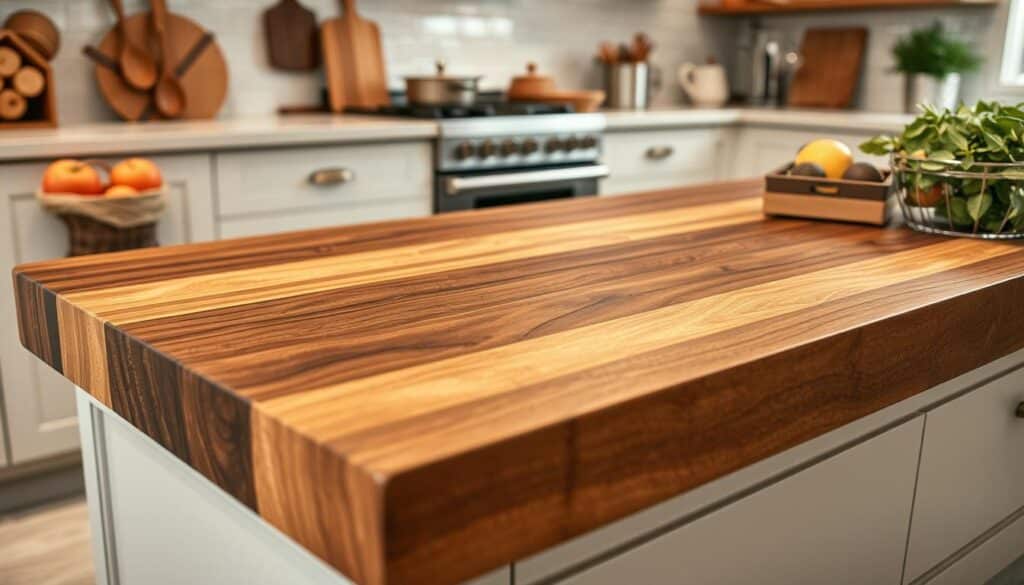
Manufacturer’s Warranties and Lifespan
When you’re looking at butcher block countertops, it’s important to know about the manufacturer’s warranties. These warranties tell you how long the countertops will last. They show how durable they can be. With proper care, they can last up to 20 years or more.
But, many things can affect their lifespan. It’s important to think about your kitchen before choosing.
Understanding Warranties for Butcher Block
Warranties for butcher block vary by the maker. They usually cover any problems with the material or how it was made. Good brands offer long warranties, showing they believe in their products.
It’s smart to read these warranties carefully. This way, you know what’s covered and how to keep the warranty valid.
Expected Lifespan of Butcher Block Countertops
Butcher block countertops can last a long time with the right care. They can go over 20 years. To keep them in good shape, oil and seal them regularly.
Countertops made from hardwoods like maple and walnut last the longest. This is because they are very dense and don’t wear out easily.
Factors Affecting Durability
There are several things that can affect how long butcher block countertops last. Things like humidity and temperature changes can impact them. How often you use them and how well you take care of them also matters.
Sealing and cleaning them well can make them last longer. This keeps them looking and working great for years.
Customer Experiences and Testimonials
Customer testimonials give us a glimpse into how butcher block countertops work in real kitchens. Many American Home clients love their look and feel. They find them stylish and practical for everyday use.
Testimonials from American Home Clients
Feedback from American Home clients varies. They praise the beauty of hardwoods like oak and maple in their kitchens. Some enjoy cutting directly on the counters, but others note that scratches and marks will appear over time.
This natural wear adds a rustic charm that many find attractive.
Real-Life Applications in Kitchens
Butcher block counters are very durable in many kitchens. One client’s walnut counters looked great after almost eight years. They credited regular oiling with food-grade mineral oil for the finish.
Yet, some areas, like around the sink, showed minor wear. This shows the need for proper care and occasional re-treatment.
Feedback on Durability and Maintenance
Feedback shows that butcher block countertops can be as durable as other materials with the right care. Clients say they can be as clean as granite or marble if maintained well. They suggest using a waterproof finish to protect against water and stains.
Minor scratches can be fixed with a light sanding. Overall, the reviews are very positive about the durability and upkeep of butcher block countertops.
Selecting the Right Butcher Block for Your Kitchen
Choosing the right butcher block for your kitchen is about installation factors and picking the right wood species for countertops. The wood you choose affects both the look and function of your countertops. Maple is durable and has a light grain, while walnut offers a rich, dark look.
Choosing the Right Wood Species
Understanding different woods is key when selecting butcher block countertops. Birch is affordable, Hevea is resilient, and cherry and teak are stunning but pricey. Each wood has its own benefits, impacting both looks and durability.
Factors to Consider During Installation
Installing butcher block countertops needs careful planning. It’s important to acclimate the material for at least 72 hours to avoid moisture issues. You might need to remove kitchen doors, drawers, and appliances for the installation.
Creating biscuit joints and drilling pocket holes helps ensure a stable fit. Applying at least four coats of food-safe oil after installation keeps your surfaces protected and looking good.
Collaborating with Design Experts
Working with design experts can make choosing and installing butcher block easier. They know the installation factors that fit your kitchen best. Whether you want a custom size or finish, they can help you make the right choice. For more on expert installation, visit American Home Design Assistance.
Final Thoughts on Butcher Block Countertops
Butcher block countertops are loved for their beauty and usefulness. They are a top pick for many homeowners. Before choosing them, think about how you cook and how you like to clean.
With the right care, these countertops can last over 20 years. They are a smart choice compared to expensive options like granite or marble.
Are They Right for Your Kitchen?
Wood countertops can stain and scratch easily. But, their warmth and charm often make up for this. To keep them looking good, oil them monthly and avoid harsh cleaners.
For those wanting a durable and attractive countertop, butcher block is a great choice. It makes any kitchen feel welcoming.
Making an Informed Decision
Think about how much care you’re willing to give. The type of wood and how it’s arranged also matters. For help, contact American Home.
Their team can help you find the perfect butcher block for your kitchen. They make sure you make the best choice.
Contact American Home for Expert Design Assistance
Ready to update your kitchen? Call American Home at (517) 349-4690. They offer free consultations to help you pick the best butcher block.
They ensure your countertops will be beautiful and functional for years to come.
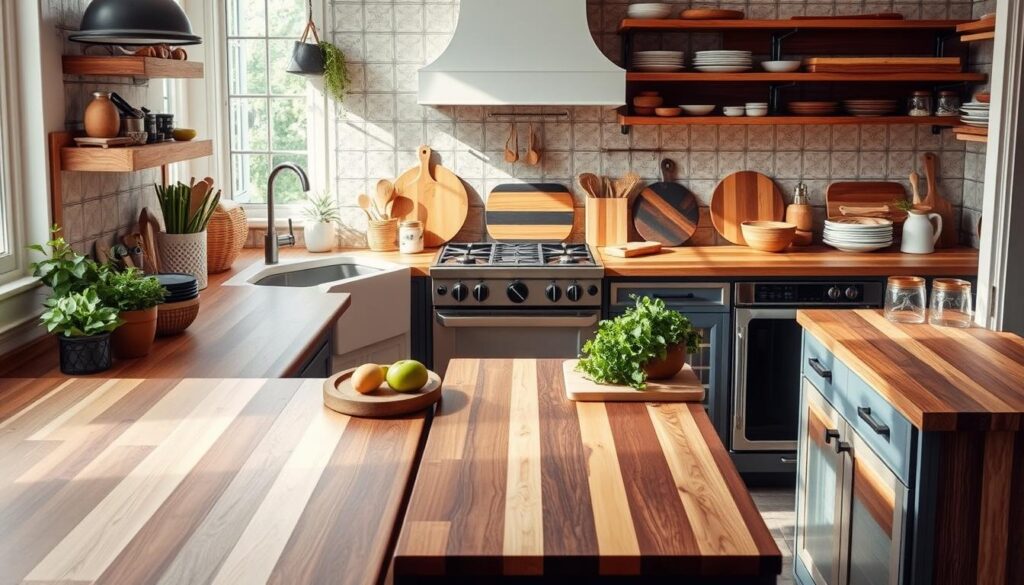
FAQ
Are butcher block countertops durable enough for everyday kitchen use?
Yes, butcher block countertops can last if you take care of them. They might get scratches and dents easier than granite or quartz. But, with regular maintenance, they can stay in good shape for a long time.
What is the average lifespan of butcher block countertops?
With the right care, butcher block countertops can last 20 years or more. The kitchen’s humidity and temperature play a big role. So, keeping an eye on these conditions is key.
How often should I oil my butcher block countertops?
Oil your butcher block countertops every 4-6 weeks. This keeps the wood from drying out and preserves its look. Regular oiling also helps lock in moisture and protect the surface.
What are the main types of wood used for butcher block countertops?
Maple, walnut, oak, and cherry are common woods for butcher block countertops. Each wood has its own look and hardness, fitting different kitchen styles and needs.
How do butcher block countertops compare to granite in terms of durability?
Granite is often better at resisting scratches and stains. But, butcher block can be fixed if it gets damaged. With the right care, butcher block can also be very durable.
Do butcher block countertops require special cleaning procedures?
Yes, they need mild soap and warm water for cleaning. Avoid harsh chemicals that can harm the wood. Also, sanitize them regularly to stop bacteria growth.
What are the disadvantages of installing butcher block countertops?
Butcher block countertops can get scratched and dented. They might also grow bacteria if not kept clean. Plus, they need regular oiling to stay looking good.
Can I use butcher block countertops as a cutting surface?
Yes, you can use them for cutting. But, use a cutting board for tough cuts to avoid scratches and keep the wood safe.
How can I address stains on my butcher block countertops?
For most stains, try a mix of baking soda and water or white vinegar. For tough stains, lightly sand the area and refinish it with food-safe oil.
What types of finishes are available for butcher block countertops?
You can choose from oils, varnishes, and sealing agents for finishes. The finish you pick affects how the countertop looks and how well it protects against moisture and bacteria. This lets homeowners pick what suits their needs best.
How can I contact American Home for more information?
Call American Home at (517) 349-4690 or email info@americanhomekbdesign.com.for more information and consultations.

